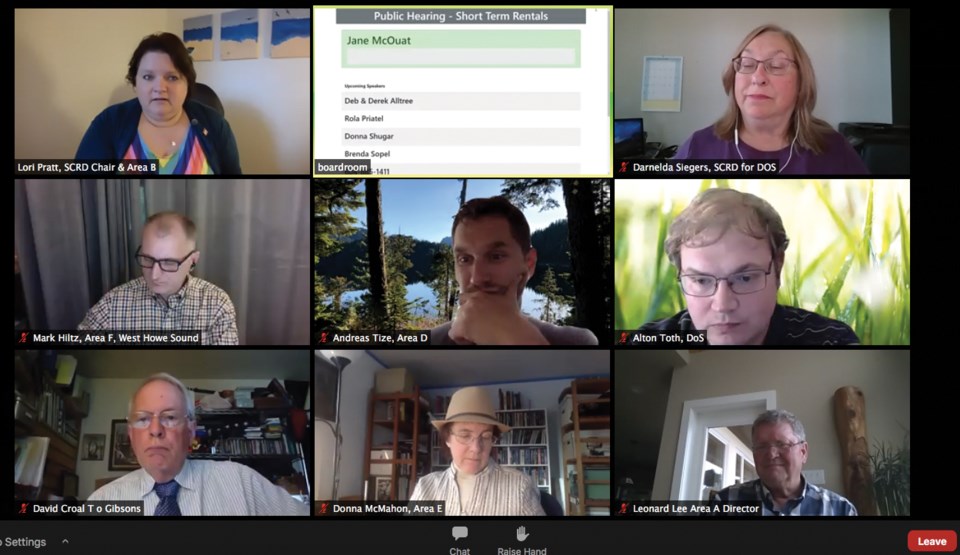A marathon public hearing about changes to a proposed short-term rental bylaw that applies to the rural areas of the Sunshine Coast Regional District (SCRD) highlighted the need to step up enforcement but heard no consensus on whether to permit off-site operators.
And several operators urged SCRD directors to relax the proposed occupancy limit of two people per bedroom.
About 20 people spoke at the hearing, including operators, residents who live near short-term rentals, and realtors. Around 200 people watched the proceedings online, according to SCRD staff.
The first speaker linked a lack of on-site operators with a lack of enforcement when issues arise.
She said her Roberts Creek neighbourhood was transformed with the arrival of a five-bedroom short-term rental. “Even though the listing said no noise after 10 p.m., with no operator on site, there was no enforcement,” she said, adding they tried tactics such as calling one of the owners who lives on the Sunshine Coast, but had to resort to calling the RCMP.
She “applauded the SCRD” for finding a middle ground with its proposed bylaw, which would require an on-site operator.
Another speaker, who lives in Pender Harbour, said she “felt like a prisoner” in her home because of rowdy guests at a smaller short-term rental that lacked an on-site operator. “You can’t run a hotel beside somebody’s house in a residential area,” she said.
Sunshine Coast Regional District (SCRD) directors had originally added a provision to the proposed bylaw to allow off-site operators to manage short-term rentals using a temporary use permit, but after a public hearing last June, they opted to remove that provision and increase fines instead.
In addition, the term “short-term rental” was removed from the bylaw and the definition of “bed and breakfast” modified as a commercial use of buildings for transient accommodation, auxiliary to the residential use, and occupied by the occupants for no more than 30 days. Providing breakfast would no longer be a defining factor, and a definition of “residential use” was added to distinguish it from commercial use.
The number of bedrooms that can be used remains dependent on property zoning, as in the previous version of the bylaw. However, the total number of occupants allowed at the bed and breakfast would be calculated on the formula of two occupants per bedroom.
In a previous version of the bylaw, the number of occupants allowed was calculated as two adults and one child per bedroom.
Several people spoke against that change, including former Roberts Creek director Donna Shugar, who described the two-person limit as a “really weird designation,” since it could exclude families. She did support the decision to require an operator on site. “That to me is the way of controlling partying,” she said.
A short-term rental operator in Halfmoon Bay agreed the two-person limit went “too far,” since it would prevent her house from being used as a family gathering place.
Another operator who owns a large luxury retreat in West Howe Sound said despite its size they have never received complaints, and that their business fills a niche, which the proposed bylaw would effectively destroy.
Former SCRD director Ian Winn, who operates a bed and breakfast in West Howe Sound, said the new bylaw would make most of the short-term rentals on the Sunshine Coast non-conforming. “Most people don’t want to operate an illegal business… We need to legitimize it.” Winn said the bedroom limit was “regressive” and asked the board to reconsider adding the temporary use permit option and investigate the option of applying business licences – something the SCRD doesn’t currently do.
Speaking on behalf of the Sechelt and District Chamber of Commerce, chair John Henderson acknowledged the Sunshine Coast is “severely lacking” in hotel accommodations and building more wouldn’t diminish demand for “cute cottages” and “small homes.” He was opposed to banning off-site operators and said enforcement is more important. “[The] issue is not about trying to restrict people from having this kind of opportunity … but it is about ensuring people abide by rules,” he said.
All rural directors were present at the meeting, which was held virtually on the video communications platform Zoom, as were Sechelt directors Darnelda Siegers and Alton Toth and Gibsons director David Croal.
The bylaws don’t apply to shíshálh Nation lands, the District of Sechelt or Gibsons.
Comments were disabled about half an hour into the meeting after the webinar was “brigaded” with more than 100 spam comments, only visible to SCRD staff. This was the first time a public hearing was conducted on the Sunshine Coast using video telecommunications since public health restrictions put a limit on gatherings of 50 people or more.



